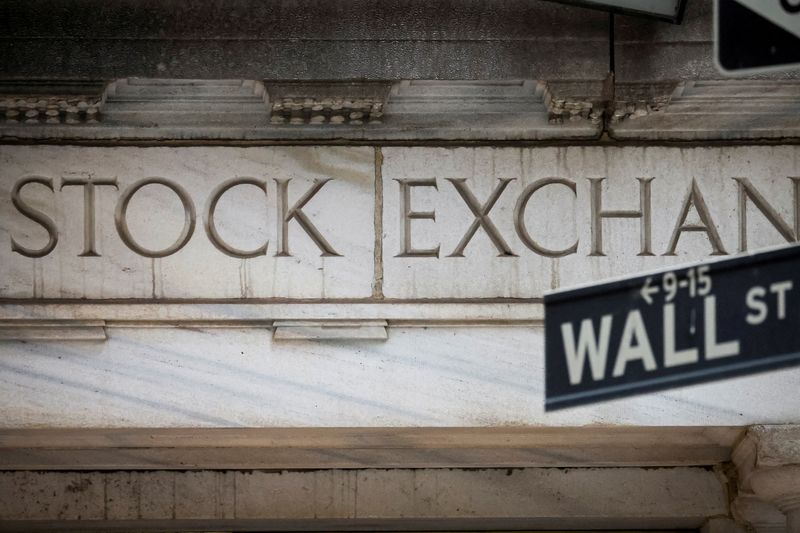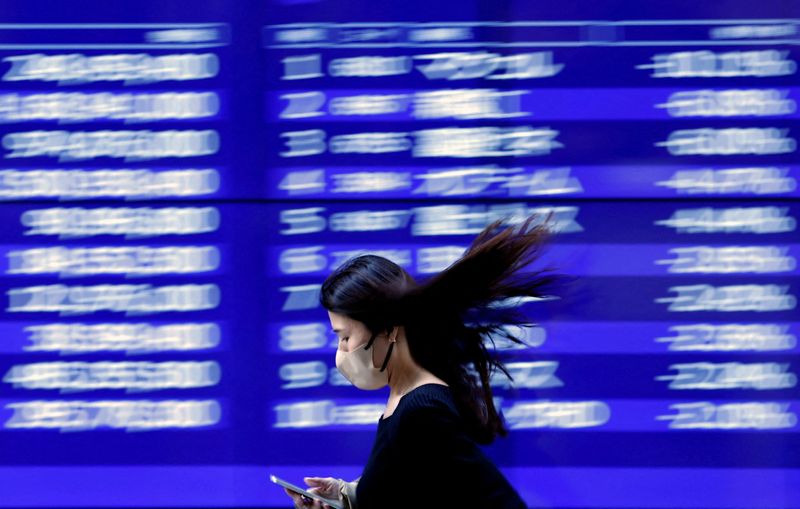By Herbert Lash and Alun John
NEW YORK/LONDON (Reuters) - Global stocks surged on Monday, with the S&P 500 closing at a new record close and European shares hitting a two-year high, as markets slashed ambitious bets at the end of 2023 on interest rate cuts by the Federal Reserve and other central banks.
MSCI's all-country world index also climbed to a fresh two-year high, closing up 0.6%, lifted by the S&P 500's sixth all-time closing high so far in January.
A slight gain in Europe's broad STOXX 600 index after its biggest weekly gain in three months last week also helped advance the global gauge of stock performance.
The equity rally comes at the start of a week packed with big corporate earnings, European inflation data, Federal Reserve and Bank of England policy meetings and U.S. employment data that could shape the market's direction for months to come.
Investors are trying to understand the outlook for the U.S. economy as it is unlikely to require the deep interest rate cuts by the Fed it has priced in, said Phillip Nelson, head of asset allocation at NEPC, an investment consultant for institutional investors in Boston.
Absent geopolitical shocks, the U.S. economy will grow better than expected with just a few areas underperforming, he said.
The Dow Jones Industrial Average rose 0.59%, the S&P 500 gained 0.76% and the Nasdaq Composite added 1.12%. With the S&P 500 up 3.3% in January, BlackRock (NYSE:BLK) raised its overall view on U.S. stocks to "overweight" from "neutral."
Mega cap earnings will be scrutinized this week after disappointing forecasts from Intel (NASDAQ:INTC) and Tesla (NASDAQ:TSLA) last week deepened concerns about the valuation of the mega growth stocks that spearheaded the rally at year-end 2023.
Microsoft (NASDAQ:MSFT), which through its partnership with Open AI has piqued market interest about artificial intelligence in 2023, is expected to report a 15.8% jump in quarterly revenue on Tuesday. The stock closed up 1.4%.
The euro sank to almost a seven-week low, breaking below the 1.08 mark, as the market dialed back expectations of the extent of rate cuts this year by the Fed and European Central Bank (ECB), said Marc Chandler, chief market strategist at Bannockburn Global Forex in New York.
"We're still reacting and correcting to what happened in Q4 last year," Chandler said.
"The market got in its head there'd be aggressive rate cuts not just by the Fed, but by the Bank of England and the ECB. The dollar sold off in that environment," he said.
The dollar index retreated, down 0.09%, while the euro slid 0.18% at $1.0832 after falling to $1.0797. The euro may be poised for a weak February, as the single currency has declined versus the dollar the past seven years during the month, Chandler said.
Investors await a press conference with Fed Chair Jerome Powell and statement by the U.S. central bank at the conclusion of a two-day policy meeting on Wednesday, and the U.S. unemployment report on Friday.
Policymakers are expected to hold the Fed's target interest rate steady at a range of 5.25%-5.50%, but some investors believe the U.S. central bank could drop its hiking bias.
The yield on the benchmark 10-year Treasury note fell 8.6 basis points to 4.074%, while the European benchmark - the 10-year German bund - slid 0.8 basis points to 2.230%.
Treasury yields had dropped sharply in November and December, helping equity markets to rally on expectations that Fed rate cuts could come as soon as March. But yields rose in January on concerns about the government's funding needs.
Treasury yields slid further on Monday after the Treasury Department said late in the session that it would need to borrow less than its previous estimates.
Asian shares rose as new steps by Beijing to stabilize the local market outweighed the drag on sentiment from a Hong Kong court order to liquidate property giant China Everglade.
Investors were also sensitive to geopolitical risks with oil rising after a Couth missile attack caused a fire on a fuel tanker in the Red Sea and a drone attack killed three U.S. troops in Jordan.
In Asia, the main drag to stocks came from a Hong Kong court order to liquidate Everglade, the poster child of China's property meltdown.
Hong Kong's Hang Sen trimmed gains on the news and closed up 0.78%, having earlier been up nearly 2% on the back of China's securities regulator saying on Sunday it would fully suspend the lending of restricted shares.
Oil prices fell more than a dollar a barrel as China's ailing property sector sparked demand worries, causing traders to reassess the supply risk premium from escalating tensions in the Middle East.

U.S. crude futures settled down $1.23 at $76.78 a barrel, and Brent fell $1.15 to end at $82.40 a barrel.
U.S. gold futures settled 0.4% higher at $2025.40 an ounce.
